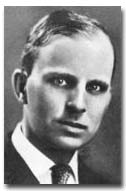| Profile | Major Works | Resources |
Benjamin McAlester Anderson, Jr., 1886-1949

Benjamin M. Anderson hailed from a business family in Missouri. After doing his undergraduate work at the University of Missouri, Anderson taught for a while in a series of local colleges, before proceeding on to his graduate studies at the University of Illinois and Columbia University. He received his Ph.D. from Columbia in 1911, under the supervision of John Bates Clark. He remained a lecturer at Columbia for two years and at Harvard for five, before he decided to abandon academia for the private sector. In 1918, he was hired by the National Bank of Commerce and, two years later, by Chase National Bank. He returned to academia in 1939, as a professor of economics at UCLA. In 1946, he joined the faculty at Cornell.
In many ways, Anderson came closest to advancing John Bates Clark's "organic" approach to economics. Anderson's thesis on Social Value, emphasized the social roots of value very much in the Clarkian vein. His 1917 book also advanced a social organic of money reminiscent of Carl Menger. Anderson was highly critical of the facile Quantity Theory, and reserved particular vitriol for monetary "cranks" (among whom he included Irving Fisher) who offered quick, mechanical "solutions" to economic problems and ignored the delicate interface between economy and society. A laissez-faire activist, Anderson was deeply opposed to state interventionism. Throughout his years in the private sector, Anderson continued to write and sat on several government commissions. He also was, incidentally, a world-class chess player.
|
Major Works of Benjamin M. Anderson
|
|
HET
|
|
Resources on B.M. Anderson
|
All rights reserved, Gonšalo L. Fonseca
